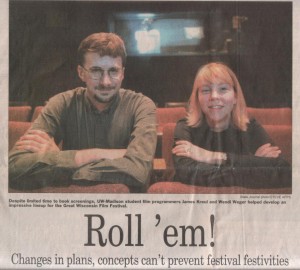[Click here to jump to correction to this post]
This is part three of a five part series of suggestions for the 2015 Wisconsin Film Festival. If you haven’t done so already, please read at least the first half of part one as a reminder of everything the Wisconsin Film Festival does right and well. With that fresh in mind, I’ll proceed to today’s suggestion.

Suggestion #3: Target younger audiences and enhance the educational role of Festival by re-committing to WUD Film programming.
First I should point out that bringing out younger audiences to the Wisconsin Film Festival is something that the Madison Film Forum itself failed to accomplish in any significant way in 2014. Our Google Analytics numbers tell us that 27.5% of our readers are 18-24 years old, and another 33.5% are 25-34. In other words, 61% of Madison Film Forum readers are under 34. But if you look at any pictures we’ve posted of 2014 audiences, it is very obvious that nowhere near that percentage of Festival audiences are under 30. Now, I could remain hopeful that a high percentage of our meager total number of younger readers were spread out somewhere among the 28,000 audience members. But my gut instinct tells me that even if we were able to crunch those numbers we’d find that many of these younger readers simply are not going to the screenings. (But as I mentioned in Part One, our numbers have gone up significantly with Wisconsin Film Festival coverage; my preliminary speculation is that many readers are simply queuing titles to stream later.) So until we can succeed in getting younger audiences in seats (any seats, throughout the year, not just the Festival), our advice on the matter admittedly remains more speculative than rooted in experience.
But I don’t accept the often muttered-under-breath premise that “students won’t go” to Wisconsin Film Festival screenings, or any screening for that matter. Students “don’t read” either, but they are still assigned books and articles for classes because teachers hope to guide them to the right path of knowledge and understanding. One obvious advantage that the Communication Arts department has over the Arts Institute and the Madison Film Forum is that if they chose to do so, they could integrate the Wisconsin Film Festival into their curriculum in both production and the critical studies courses. Some instructors have already been doing this, like production instructor Erik Gunneson, who attends at least one screening with his class and invites at least one visiting filmmaker to visit his classroom each year. A more systematic department-wide approach to this would be a lot of hard work, and like any well designed curriculum it would need—to play my broken record once again today—a clear mission statement for the Wisconsin Film Festival.
What kind of student would the Communication Arts department like to see walk at graduation with a Radio/TV/Film degree? I would think that it would be someone with an interest in both the production and critical studies sides of the department. And someone who could draw upon the unique film culture on the UW-Madison campus and contribute to it with lessons learned from instructors specializing in institutional film histories.
In a nutshell, I think Wendi Weger, who co-programmed the first Wisconsin Film Festival in 1999, would be a good role model for today’s Communication Arts majors. In addition to working with her on that first Festival, I was her instructor for a 16mm film production course, and I recall that she drew inspiration from her film history and analysis courses. I would like to think that her coursework, along with her experience programming at WUD Film, made her uniquely qualified to step into her role in the inaugural Festival. She subsequently worked with the New York Underground Film Festival, got a masters degree in Film Studies at New York University, and even came back to the Festival as an actress in Peggy Ahwesh and Bobby Abate’s Certain Women. As the Communication Arts department shapes the educational mission of the Wisconsin Film Festival, they might consider the question, “How can the Festival foster more students like Wendi Weger?”
Unfortunately, I’m not sure if current Festival leaders share my enthusiasm for the educational opportunities of undergraduate film programming.
I asked current Director of WUD Film, Bess Donoghue, to describe its current relationship with the Wisconsin Film Festival. She never intended to do so, but her response, to be honest, horrified me.
WUD Film does collaborate with the Wisconsin Film Festival. This year we programmed Love Child, and last year we programmed Gideon’s Army. Each year we send students to the Sundance Film Festival to scout out films for the upcoming year, and when we get back, we send suggestions to Jim Healy to see what he might be interested in. From there, he finds a film to program and invites a committee member to write up the description for the festival guide, introduce the film, and lead a Q&A after the film if the director is present.We have had a lot of fun doing this over the last two years, and we hope to continue it in years to come.
 A Modest Proposal
A Modest Proposal
An even better version of this idea would be to spread those 12 films across the various venues, including 4070 Vilas Hall. Let’s not get ahead of ourselves, since none of this is likely to happen. But when a Festival representative visits a WUD Film meeting to negotiate the use of the Marquee in 2015, I hope just one committee member raises his or her hand and asks, “Now that I know a little of the history of the Festival, including WUD Film’s integral role in its creation, and how much you need our Marquee Theater, why couldn’t it work this way?”
If the Communication Arts-based new leadership of the Festival object and argue, “Why should we foot the bill for 12 WUD Films and only get use of the hall for 5?” the answer is the same as why the Arts Institute was footing the bill for Communication Arts programmers with little to no say in programming since Meg Hamel was removed from programming decisions. I wasn’t at that meeting, so I don’t know it, but it is the exact same reason.
If the objection rises, “What if the quality of the programming goes down?”, I would reject the assumption behind the question until someone could convince me that there was “bad” WUD Film programming at the Wisconsin Film Festival in the past (and we’ll broadly define “bad” as “without merit, or without any potential audience”). But for the sake of argument, lets assume that quality might be in jeopardy with undergraduate programming. Take a cue from Bo Ryan and coach ’em up. I’m confident that the Communication Arts department, and qualified University staff like WUD Film advisor Tom Yoshikami (a fine film programmer in his own right) can teach ’em up. One need not look too far from the Communication Arts tree to find possible curricular models for this. For example, alumni Tim and Liza Palmer started an undergraduate film journal at the University of North Carolina-Wilmington, Film Matters, and UNCW also sponsors a student-run film festival and conference, Visions. In both of these projects, students take a combination of directed studies and special classes across two semesters.
The benefits of such a proposal should be obvious to anyone not preoccupied with any kind of turf war. Students would be (re-)empowered to be active participants in their local film culture. And the Festival would have at least 12 films that younger audiences would be interested in, because younger programmers selected them. That wouldn’t necessarily guarantee younger audiences, but the student attendance at the Festival could only go up, because it can’t go much further down.
Note that for this suggestion to work, WUD Film would seriously have to step up its game. In an admittedly snide tweet, I suggested to WUD Film that they needed to post the schedule to their Mini-Indie Film Festival more than four days before it started. Looking elsewhere in the Twitter feed, we can find that both Scott Gordon at Arts Extract and Rob Thomas at Capital Times and Madison Movie seemed frustrated that they couldn’t get earlier information about Mini-Indie. Keeping an eye on our Alternative Screening Calendar, I’ve been amazed how often a WUD Event will pop up in the feed at practically the last minute (examples include Fuego and the Starlight Avant-Garde screenings in February, and visiting filmmakers Adam Paradis and J.B. Mabe in March). All of these examples suggest reasons why WUD Film shouldn’t be equal partners in the Wisconsin Film Festival. So please, WUD Film, stop giving people such reasons.